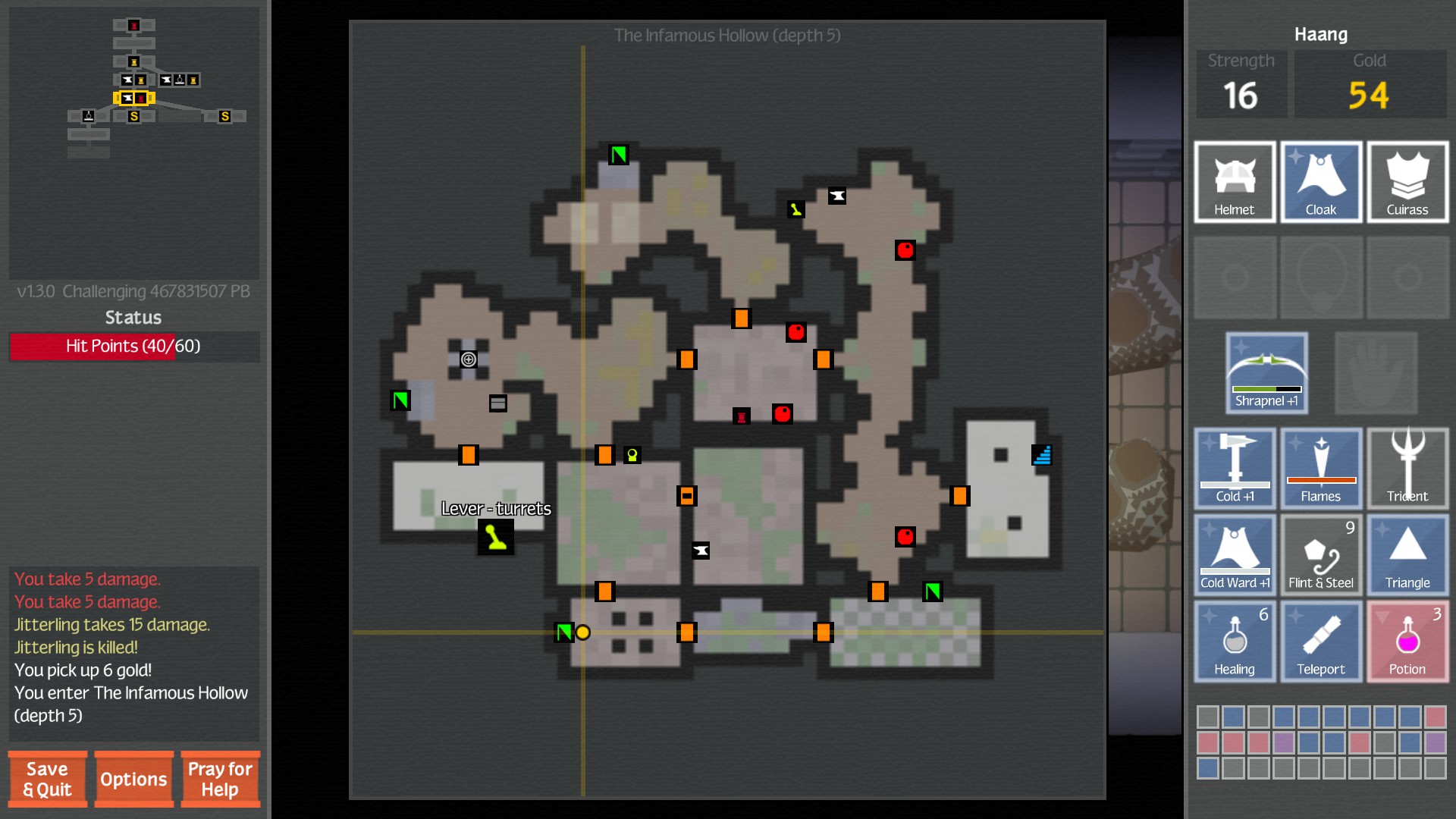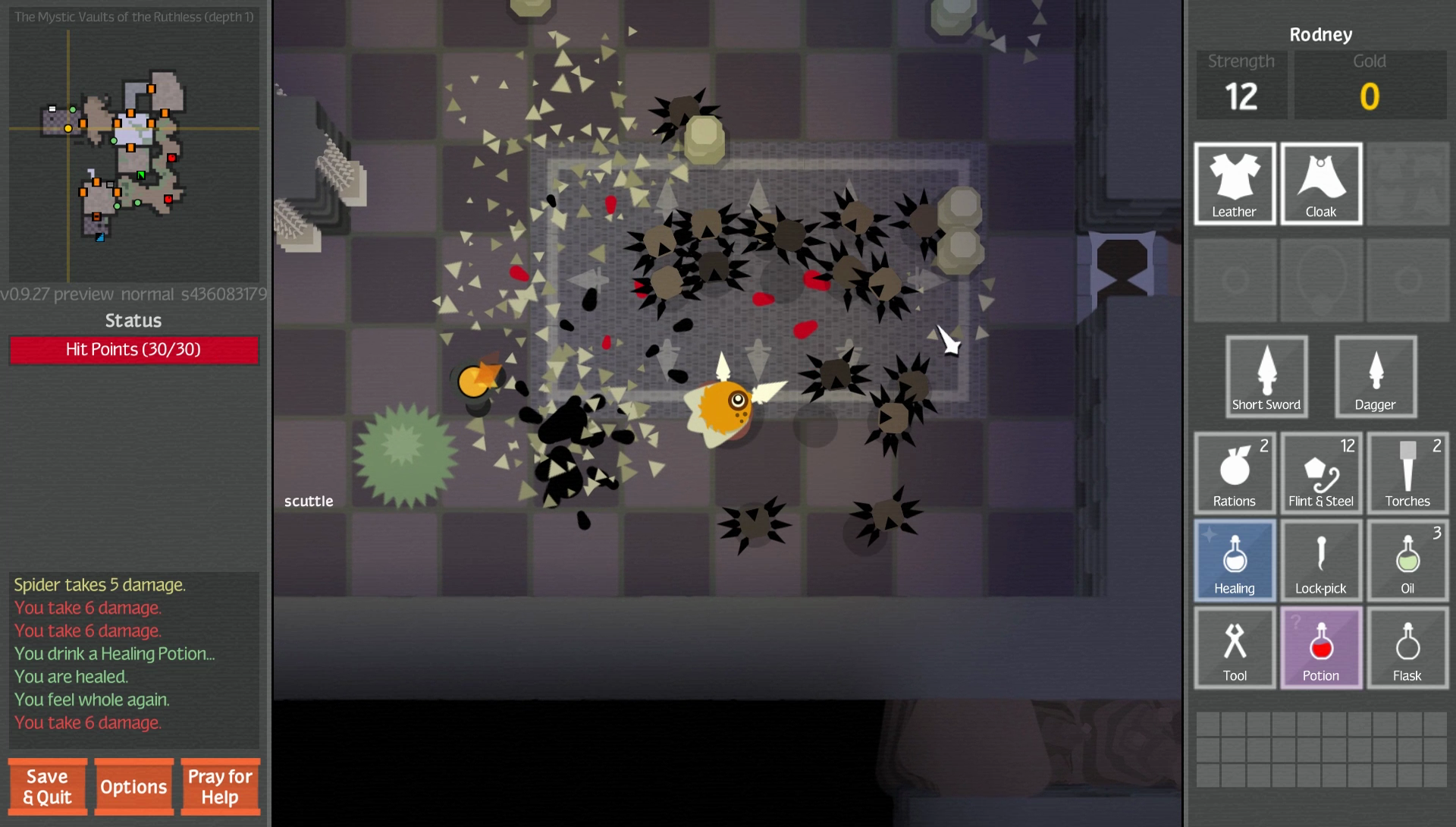Search
[{{{type}}}] {{{reason}}}
{{/data.error.root_cause}}{{{_source.title}}} {{#_source.showPrice}} {{{_source.displayPrice}}} {{/_source.showPrice}}
{{#_source.showLink}} {{/_source.showLink}} {{#_source.showDate}}{{{_source.displayDate}}}
{{/_source.showDate}}{{{_source.description}}}
{{#_source.additionalInfo}}{{#_source.additionalFields}} {{#title}} {{{label}}}: {{{title}}} {{/title}} {{/_source.additionalFields}}
{{/_source.additionalInfo}}- Details
- Category: Computer
- By Sam George
- Hits: 5182
Unexplored (PC)

Unexplored
Developed by: Ludomotion
Published by: Ludomotion
Release date: February 22, 2017
Available on: Windows
Genre: Action RPG (Roguelite)
Number of players: 1
Price: $9.99
Thank you, Ludomotion, for sending us a review key!
Procedural generation, roguelike elements, simplistic graphics: among indie games, these elements are legion. The game joins its contemporaries by using the high difficulty, permadeath, and general item randomness that define roguelikes. Unexplored embraces these and other cliches such as unidentified magical scrolls, unexplained altars, and cryptic notes left by previous explorers. All this takes place in the classic procedural Dungeon of Doom where stairs in the volcano can lead to a prison which leads to a library which leads to a jungle which leads to an ice cave. Unexplored goes back to its roots and, in so doing, emerges as an accessible and engaging throw-back to the ASCII dungeon delves of yore.
Unexplored tasks the tiny yellow player cyclops with the goal of entering the Dungeon of Doom and returning with an amulet. If you wish, you can spend some of your gold to buy extra starting gear or get tips on the dungeon. Gold accumulates over time and is tracked throughout your dungeon trips and deaths, so don't spend it too quickly. Different starting items and classes are unlocked by fulfilling certain tasks in the dungeon such as collecting arrows or killing goblins (this overlaps with the Achievement system). This kind of progression labels a game "roguelite." Your first several trips will likely be spent learning about the dungeon's common enemies and traps while trying to unlock more starting gear. If you take your roguelikes in just that flavor--like the game Rogue--you are welcome to spend no gold and to start with no extra tools except your accumulated knowledge.
Once you enter, you can't leave without the dragon-guarded amulet. The wise player will thoroughly explore the given instance of the dungeon in order to collect as much useful gear as possible before the dangerous lower levels. Much of what you find in chests and enemy corpses are standard swords, spears, and so on. There are a good variety of weapons which attack in different ways and have different cooldown times. There is also basic armor. These reliable standard pieces of equipment will do you good for a while, but eventually you're going to need the proverbial big guns: magic items.

Strong Points: Excellent procedural dungeon generation (expansive content and varied layouts); real-time action that keeps the feel of turn-based roguelikes; good item variety; clear, informative visuals; useful difficulty settings
Weak Points: Occasional framerate and sound glitches; aspects of the interface are unexplained
Moral Warnings: Functional magic and prayer to various gods; large cartoon blood splatter; some scary imagery; references to alcohol
Unfortunately, magic items come unidentified. Usually you will have to equip and use one to determine what augment it has. Often that shiny sword will shoot lightning or deal fire damage, but perhaps it is cursed to slow you while preventing you from unequipping it. Even items taken from fallen foes might be cursed, so there is always a risk to using magic. The same applies to rings, amulets, helmets, armor, and magic scrolls, which must be read to trigger the effect and, consequently, find out if you just gained strength or called a group of floating knives to attack you. The negative effects hurt, but almost none of them are game-ending when tested in a safe environment. The risk is further mitigated by magical scrolls of identity which tell you what a given item or potion does. You can forge magic items at anvils in the dungeon to pick their augment. Sometimes the game provides a note with a potion or scroll to give context. You can also throw unknown potions at enemies; in fact, this is recommended. Every creature in the game follows the same rules as the player. If that purple liquid is a Potion of Combustion, it will be as happy to combust an enemy as it will be to combust yourself.
Combat takes place in real-time and requires planning and care. Weapons deal damage by running them into a foe or by swinging/thrusting them for extra damage. Both options put the weapon in a brief cooldown during which it doesn't harm enemies or block their attacks. As you balance your weapons' cooldowns with those of the enemy, battles become stuttering dances of tag mixed up by weapon variety (maces, clubs, whips, and more) and enemy type. Again, fights have to be approached with planning: a room full of basic wolves can be deadly if the player has no way of escape. It is moments such as those that often led to me reading every scroll I owned in the hopes of being randomly teleported away.
"Planning" in this game means more than observing a room before entering. Often the books scattered around the dungeon contain information on bosses and levels to come. For example, you might learn that a mage likes fire magic and you'd best chug a Potion of Resist Fire before engaging. These hints and solutions take place over multiple floors of the dungeon, requiring the player to go up and down stairs--of which there might be several on a floor.
Notes will also help you reach treasure caches and pick the right item from a group of pedestals. This small bit of puzzle-solving, along with the varied dungeon layouts, lends a good deal of depth to Unexplored. Difficulty settings adjust the numbers of puzzles, magic items, enemies, and bosses. There are noticeable differences between them, so dungeon-delving experts can enjoy the experience along with the uninitiated. The text seed used to randomly generate the dungeon can be set, allowing dungeons to be replayed and shared online.

Higher is better
(10/10 is perfect)
Game Score - 84%
Gameplay - 18/20
Graphics - 9/10
Sound - 6/10
Stability - 4/5
Controls - 5/5
Morality Score - 84%
Violence - 7/10
Language - 10/10
Sexual Content - 10/10
Occult/Supernatural - 6/10
Cultural/Moral/Ethical - 9/10
Unexplored's gameplay is solid; however, the game itself is rough around the edges. The graphics are vibrant and instantly let you recognize items, yet the music is quite forgettable. I experienced multiple freezes and sound issues (unrelated to the Cursed Helm of Deafness). It was also several hours before I found certain parts of the HUD. While one could blame this on me as an unobservant player, I had trusted the tutorial to explain the interface. Unknown scrolls are essential to the game's design; unexplained menu buttons are not.
Morality concerns include much cartoon blood and some scary moments involving the monsters and spiders and those spiders jumping out of eggs which cause more to jump out...*shudders*. The gold-for-hints system takes the form of buying your guide a beer at the tavern. Altars and references to gods are spread throughout the dungeon. The player always has the option to pray for help (which typically comes in the form of a door being opened).
Unexplored offers a fresh take on the essential roguelike formula. It is not, however, going to win over players who do not enjoy the genre. The description on Steam, "the roguelite that feels like a roguelike," uses jargon such that it's clear this game was built for people who know the expected tropes of difficulty, randomness, and procedural generation and enjoy them. If you've never picked up a roguelike, Unexplored is a great way to try the genre out. It's accessible, fun, and visually stimulating. If, on the other hand, you know exactly what to expect from the genre, you already know whether or not you will like Unexplored. Those who are repelled by randomness and contextless dungeon dives will be repelled by this game. Those who love the inherent surprises and challenges of the genre will almost certainly enjoy Unexplored.






